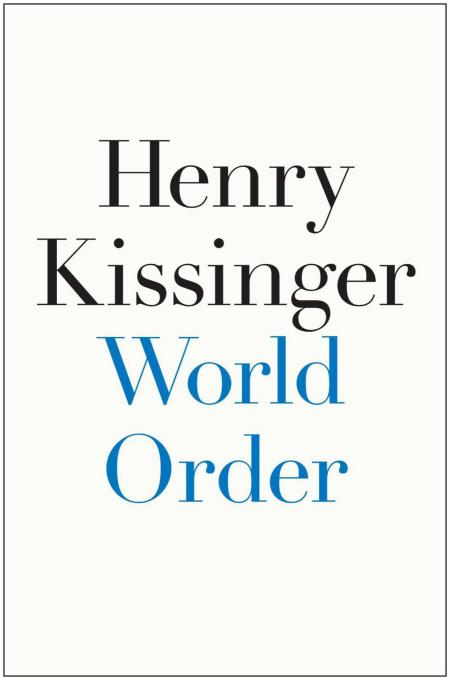
World Order
کتاب های مرتبط
- اطلاعات
- نقد و بررسی
- دیدگاه کاربران
نقد و بررسی

Starred review from August 25, 2014
Former U.S. Secretary of State Kissinger elicits strong reactions; the man some call "war criminal" also won the 1973 Nobel Peace Prize. At 91, he is still crafting his own record and place in history. A fixture in international politics since the 1960s, Kissinger argues that, assisted by the U.S., the spread of independent sovereign states, democratic aspirations, and global networks in communications, finance, and health have brought the "enterprise of world ordering... to fruition." Kissinger's guiding principle is what he calls the "global Westphalian system," named for the 17th-century treaty that ended the 30 Years' War. In studying the U.S.'s role in this system, his main theme is the "contest between idealism and realism" in American foreign policy. Kissinger's section on the Middle East focuses on U.S. partner Saudi Arabia and adversary Iran, but sidesteps the elephants-in-the-room of Israel and world oil. While considering the threat posed by the acquisition of nuclear weapons by rogue states, he also discusses the possibility, tenuous as it may be, of rapprochement between the U.S. and Iran. Some readers will feel Kissinger whitewashes the Bush administration's legacy in Iraq and the Middle East. Others will ask if Kissinger's stark title is ironic, given sharply escalating international conflict. Nonetheless, Kissinger's thoughts, grounded in some 50 years of experience, deserve a wide, attentive audience that should include anyone interested in foreign affairs or the global future. Agent: Andrew Wylie, Wylie Agency.

August 15, 2014
Former Secretary of State Kissinger (On China, 2011, etc.) considers the prospect for order in a world without agreed-upon rules. At a time when many nations differ on the meanings of democracy, human rights and international law, the 21st-century world is in a state of flux regarding the concepts of power and legitimacy-the foundation of world order. In fact, the world has never achieved world order, writes Kissinger. It came closest four centuries ago when warring European states, under the Peace of Westphalia, recognized state sovereignty and principles of international relations. Those rules and limits diminished greatly after World War II, when the United States dominated the Atlantic Alliance. They never reigned globally in a world of divergent cultures, histories and theories of order. In this erudite view of our disordered world, Kissinger views each region from a historical perspective to reveal the forces behind differing views of world order. In the Arab world, he finds that Islam is "a religion, a multicultural superstate, and a new world order," where, in the case of Iran, for example, negotiation is seen as part of "an eternal religious struggle." The "ominous" disintegration of Arab nations into tribal and sectarian units, writes the author, recalls the religious wars in pre-Westphalia Europe. Kissinger traces the rise of America's idealistic vision of world order-one based on the universality of American principles-and credits the U.S. with many contributions to global order while noting that America "has risked extremes of overextension and disillusioned withdrawal." The author also discusses the role of science and technology in shaping world affairs, urging that the instant information afforded by the Internet be viewed within the broader context of history. Regions must agree on their own concepts of order before they can relate to one another. An astute analysis that illuminates many of today's critical international issues.
COPYRIGHT(2014) Kirkus Reviews, ALL RIGHTS RESERVED.

September 15, 2014
Former secretary of state Kissinger has publicly commented on several recent occasions that the most important challenge facing the U.S. is the creation of a new world order to bring resilience to a planet faced by many complicated and potentially devastating international challenges. As explained in this selection, Kissinger's vision for international order is inspired by the Westphalian system, which, in ending the Thirty Years' War in the seventeenth century, made nation-states the primary building blocks of modern world order. His appeal for a reinvigorated Westphalian system will not surprise anyone familiar with the Kissingerian realpolitik philosophy that undergirded the foreign policy of the Nixon and Ford administrations. But in today's context, it risks being seen as something of a throwback to an era in which state power was not yet limited by supranational bodies like the European Union, or challenged by networked stateless communities or corporations. Ever-astute Kissinger is, of course, aware of such controversies, and some of the most fascinating portions of this book are those in which the great strategist grapples with the challenges technology poses not just to international order but to governance itself.(Reprinted with permission of Booklist, copyright 2014, American Library Association.)

September 1, 2014
As a Machiavellian adviser to Republican presidents, Kissinger meditates on his realpolitik approach to international affairs at the beginning of the 21st century. "Leftists" condemned his elitism and concern with the major powers, while "rightists" condemned his willingness to negotiate with Soviet leaders. The former secretary of state begins by providing a historical account of how the Old World (Europe, Africa, and Asia) implemented a balance of power approach to maintain order. Later, he reflects on contemporary politics of the United States, China, Russia, and Iran. He theorizes that the modern American experience stems from Theodore Roosevelt's realism and Woodrow Wilson's idealism in foreign affairs. Though Kissinger's heart may be with Roosevelt, he demonstrates how Wilson's rhetoric affected the New World experience, particularly the Americas, influencing not only Franklin Roosevelt but also Richard Nixon, who kept a portrait of Wilson in the White House's Cabinet Room. VERDICT Critics are unlikely to find much interest in this volume as it largely summarizes Kissinger's thinking, but students and historians of political science may appreciate his suggestion that both realism and idealism are necessary in modern times. [See Prepub Alert, 3/17/14.]--William D. Pederson, Louisiana State Univ., Shreveport
Copyright 2014 Library Journal, LLC Used with permission.

























دیدگاه کاربران